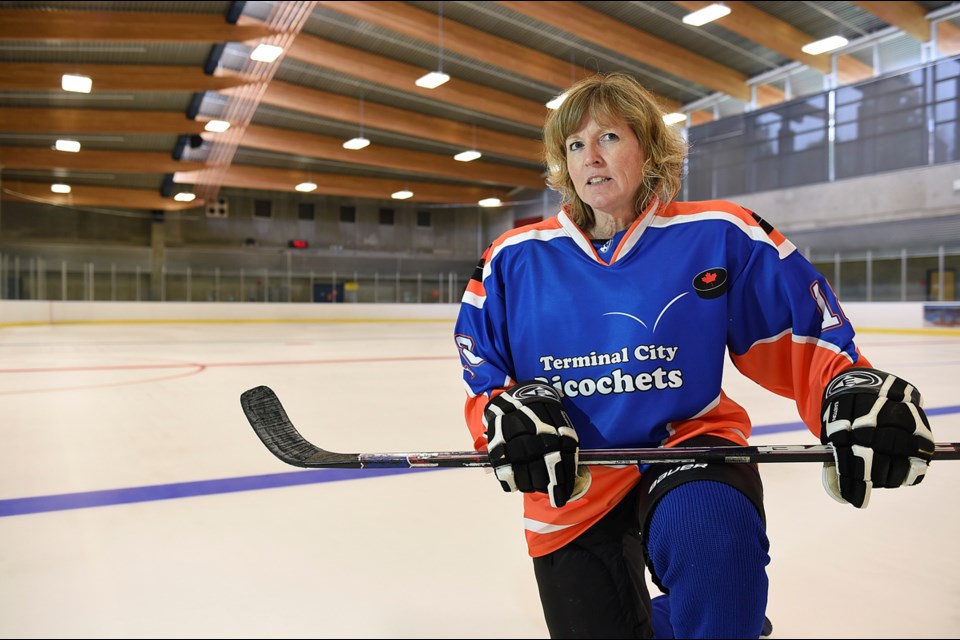Steel, nylon, plastic, ice and rubber â separately, they have little to do with one another.
Collectively, those things have inextricably linked generations and forged life-long relationships.
Those are the kinds of legacies brought on by sport, and theyâre a central theme to the inaugural Americas Masters Games, which run Aug. 26 to Sept. 5 at venues and locales across Vancouver. Â
In the case of beach volleyball duo Hatsue Chow and Sandi Caverly, the ties that bind run deep.
Caverly met her husband on a volleyball court. Chowâs daughter is dating Caverlyâs son â both play competitive beach volleyball as well.
âYou meet so many good people through sport,â Caverly told the Courier. âBecause the Masters Games are in Vancouver, we are going to be able re-connect with old friends and teammates, so thereâs a very social aspect to us wanting to participate as well.â
The format of the games lends itself nicely to those types of connections: itâs open to anyone over the age of 30 and includes participants who are well into their 60s, 70s and beyond.
Chow is 65, while Caverly is 56. Theyâre competing in the 55-plus age bracket, but will also play round robin games in the 50-plus field against teams from Holland, Switzerland, the U.S. and others from across Canada.
âOf course I want to win â always,â Chow said. âBut if we donât win, thatâs fine. Just playing beach volleyball at my age makes me happy.â Â
Chow and Caverly met five years ago while playing drop-in volleyball. Their synergy on the court was instantaneous, given theyâre roughly the same height and played the same position.
The upcoming games, however, present an interesting challenge: sand is not their surface of choice and thereâs little to no semblance of formal positions. Â
And then there are considerations they have absolutely no control over.
âItâs a whole different game all together than what we are used to playing indoors,â Caverly said. âWith the beach game, you really have to use your overall skills. And in this last week, weâre finding that dealing with the elements â the wind and the sun â changes the ball significantly. At an older age itâs harder for us to move to the ball and get there as quickly as we could in the past.â
While the pair have travelled distinctly different paths in life â Chow moved to Canada from Japan 46 years ago, while Caverly grew up in Vernon â the similarities they share are striking.
Both got their start in volleyball at a young age and credit high school coaches for helping them hone in on a sport they liked and excelled at. They both stand at 5â3, are staunch competitors and enjoy both the recreational and social aspects of sport.
But for Chow, thereâs a more spiritual connection to volleyball as well, given that her husband suffered a stroke five years ago.
âItâs really important for me to look after him so he can live a reasonably good life. I canât die before him, and in order to do that, I have to be in shape. Volleyball is a sport I really enjoy and it keeps me in shape.â Â
Like Caverly, Janis Dalgleish met her main squeeze through sport as well.
The former Courier sales representative was in the process of learning all things puck 13 years ago when she laced them up alongside her husband-to-be at a co-ed drop in game.
âAt that point it became his mission that I would become a hockey player,â she said. Â
While Dalgleish knew how to skate at the time, the mechanics of her game needed work: she went to public skates, got active in drop-in hockey and signed up for lessons.
When she was the lone female in her lesson group, her husband â who has played for decades â signed up as well to offer some solidarity.
âWhat I would do is work on one thing in every game. One day itâs working on my slap shot, another days itâs working on my pivots. That was my mentality in trying to better myself. Once I topped out, I thought, âOK, Iâm not going to fall.â Thatâs an awesome feeling.â
Fast forward to Sunday and Dalgleish will be playing for keeps in the womenâs 50-plus bracket alongside her Terminal City Ricochet teammates. The squad is a mishmash of 14 players from drop-in games and rec leagues across Metro Â鶹´«Ã½Ó³»and only held their first practice as a team on Aug. 21.
While some of the faces are unfamiliar, six of her teammates have been with Dalgleish since the beginning of her on-ice pursuits. Those relationships have blossomed into to the type of thing that transcend a shifty back-hand pass or a wrist shot that goes top shelf.
âTheyâre teammates, but man, they will come to your rescue if need be,â she said. âThe dressing room is actually the most important part of my game because youâre bonding with people.â
The World Americas Games features competition in more than 20 sports at venues across the city: Stanley Park, Kits Beach, Trillium Field, UBC, Empire Field and the Â鶹´«Ã½Ó³»Convention Centre. Nightly celebrations, including the opening ceremonies on Aug. 27 and closing ceremonies Sept. 4, will take place in Jack Poole Plaza and at the Â鶹´«Ã½Ó³»Convention Centre. Organizers say 5,000 participants from 52 countries will take part in the games.
For information, go to americasmastersgames2016.com.
@JohnKurucz



